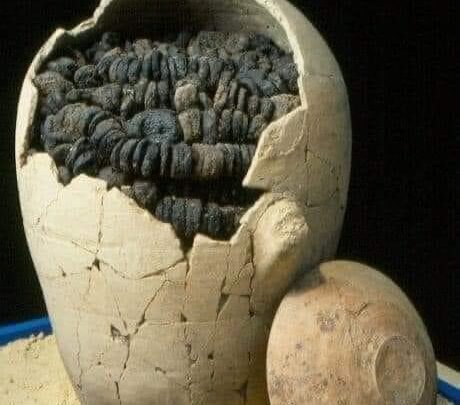العثور على جرة عمرها 3100 عام مليئة بالتين المحروق مربوطة ببعضها البعض بخيوط، في عقرون، فلسطين
صور من تاريخ بلادي

تم العثور على جرة عمرها 3100 عام مليئة بالتين المحروق مربوطة ببعضها البعض بخيوط، في عقرون، فلسطين
لا تتوقف الاكتشافات الأثرية عن إبهارنا أبدًا، حيث تقدم لمحات عن الحضارات القديمة وأسلوب حياتها.
أحد هذه الاكتشافات الرائعة حدث مؤخرًا في عقرون، ، حيث تم اكتشاف جرة عمرها 3100 عام مليئة بالتين المحروق، مربوطة ببعضها البعض بشكل معقد بخيوط.
يلقي هذا الاكتشاف الضوء على ممارسات الطهي والتقاليد الثقافية في المنطقة في القرن الثاني عشر قبل الميلاد.
جرت أعمال التنقيب في عقرون، وهي مدينة فلسطينية قديمة
كان الفلسطينيون معروفين بثقافتهم المميزة، والتي تضمنت أساليب فخارية فريدة وتقاليد طهي.
تم اكتشاف الجرة التي يبلغ عمرها 3100 عام، وهي شهادة على أسلوب حياتهم، سليمة ودُفنت في عمق الموقع الأثري.
داخل الجرة، توصل علماء الآثار إلى اكتشاف مذهل حقًا؛ مجموعة من التين المحروق.
كان هذا التين جزءًا مهمًا من النظام الغذائي الفلسطيني القديم، ولم يتم وضعه بشكل غير محكم في الجرة فحسب، بل تم ربطه معًا بشكل معقد باستخدام الخيوط.
يشير هذا الترتيب إلى أنه ربما تم تخزين هذا التين لاستخدامه لاحقًا أو ربما حتى كشكل من أشكال التقدمة أو الممارسة الشعائرية.
البحث يحمل أهمية كبيرة للباحثين والمؤرخين.
أولاً، يقدم نظرة ثاقبة للعادات الغذائية للفلسطينيين خلال القرن الثاني عشر قبل الميلاد. كان التين عنصرًا أساسيًا في نظامهم الغذائي، وتشير ممارسة تجميعهم معًا إلى تقنيات الطهي وطرق حفظ الطعام.
ثانيًا، يمكن ربط التين المحروق وتقديمه داخل الجرة بالطقوس أو القرابين القديمة. تساعدنا مثل هذه الاكتشافات على فهم الممارسات الدينية والثقافية لهذه الحضارة القديمة بشكل أفضل.
إن جرة تين عكرون ليست اكتشافًا معزولًا ولكنها جزء من سياق أثري أوسع.
وهو ينضم إلى مجموعة من القطع الأثرية التي تم اكتشافها في هذه المنطقة على مر السنين، مما يقدم صورة شاملة عن تاريخ المدينة القديمة وثقافتها وتفاعلاتها مع الحضارات المجاورة.
يعد اكتشاف جرة عمرها 3100 عام مليئة بالتين المحروق في عقرون بمثابة شهادة على الاكتشافات المستمرة التي يسلط عليها علم الآثار الضوء.
يقدم هذا الاكتشاف لمحة عن تقاليد الطهي وربما الممارسات الروحية للفلسطينيين خلال القرن الثاني عشر قبل الميلاد. ومع استمرار الباحثين في تحليل ودراسة هذه القطعة الأثرية الرائعة، فإنها تعد بإثراء فهمنا للحضارات القديمة وأسلوب حياتها.
A 3,100-year-old jar filled with burnt figs, tied together with string, was found in Ekron, Palestine.
Archaeological finds never cease to amaze us, offering glimpses into ancient civilizations and their way of life.
One such remarkable discovery occurred recently in Ekron, where a 3,100-year-old jar filled with burnt figs was discovered, intricately bound together with string.
This discovery sheds light on the region’s culinary practices and cultural traditions in the 12th century BC.
The excavations took place in Ekron, an ancient Palestinian city
The Palestinians were known for their distinct culture, which included unique pottery styles and culinary traditions.
The 3,100-year-old jar, a testament to their way of life, was discovered intact and buried deep within the archaeological site.
Inside the jar, archaeologists made a truly amazing discovery; A bunch of burnt figs.
These figs were an important part of the ancient Palestinian diet, and were not only loosely placed in the jar, but intricately tied together using string.
This arrangement suggests that these figs may have been stored for later use or perhaps even as a form of offering or ritual practice.
The research holds great importance for researchers and historians.
First, it provides insight into the dietary habits of the Philistines during the twelfth century BC. Figs were a staple of their diet, and the practice of grouping them together indicates cooking techniques and food preservation methods.
Second, burnt figs and offering them inside the urn could be associated with ancient rituals or offerings. Such discoveries help us better understand the religious and cultural practices of this ancient civilization.
The Akron fig jar is not an isolated find but part of a broader archaeological context.
It joins a collection of artefacts that have been discovered in this area over the years, providing a comprehensive picture of the ancient city’s history, culture and interactions with neighboring civilisations.
The discovery of a 3,100-year-old jar filled with burnt figs at Ekron is a testament to the ongoing discoveries that archeology is bringing to light.
This discovery provides a glimpse into the culinary traditions and perhaps spiritual practices of the Philistines during the 12th century BC. As researchers continue to analyze and study this remarkable artifact, it promises to enrich our understanding of ancient civilizations and their way of life.

.png)



